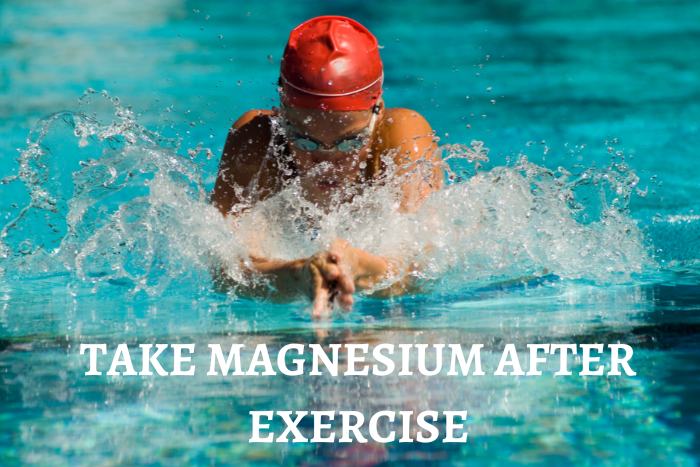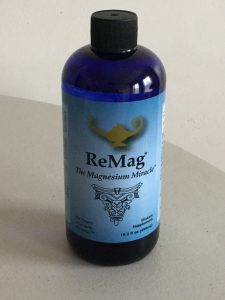
Magnesium, like the mineral, is vital for athletes. We must take magnesium after exercise. Why? During workouts, the magnesium is lost. If athletes want to keep their energy levels up and not experience lactic acid buildup, they must take magnesium supplements.
Magnesium is an essential nutrient
When the magnesium amount is short, and calcium value is high, muscle cramps and lactic acid buildups occur. You will ask why?
When there is too much calcium, the initiator for muscle contraction, and less magnesium, the initiator of muscle relaxation, muscle cramps and lactic acid buildups occur.
Lactic acid causes pain after exercise because it builds up in the muscles. Magnesium relaxes muscles. The pain is gone.
Take magnesium after exercise

Magnesium influences energy packets. These packets are called ATP or adenosine triphosphate. Studies done on animals show that magnesium restores endurance. It means that magnesium helps to recover after exercise. Magnesium reduces lactic acid build-up too.
Magnesium helps adrenal glands.
Everybody who jogs or runs long distances knows and feels the adrenaline rush after the long distance. It seems when the end is close; it’s hard to run. Fortunately, suddenly, you feel like a second breath or adrenaline burst helps you to move again without effort. People are addicted to this feeling because it gives them a sense of power and joy.
Unfortunately, adrenaline glands may deplete to the maximum. The one way to help them is magnesium and proper nutrition.
Magnesium and sudden cardiac death syndrome
According to Carolyn Dean, MD, ND, the author of Magnesium Miracle, athletes are at risk. They can drop dead from sudden cardiac death syndrome if the magnesium is deficient in their bodies, especially during competition.
The cardiovascular system requires magnesium as the vital nutrient which participates in the prevention of rhythm problems. Magnesium improves blood flow to the heart, helps relax the heart’s muscles, and protects the heart from calcium overload.
Besides it, magnesium breaks down blood clots that block the arteries. Magnesium reduces the damage of free radicals. When athletes take magnesium after exercise, they avoid the risk associated with heart problems.
The dosage of magnesium to athletes and people who exercise
Carolyn Dean, MD, ND, provides recommendations for magnesium from Dr. Seelig, the magnesium specialist.
For a 220-lb man: 600-1000 mg per day
For a 150 lb woman: 400-680 mg per day
These doses can be reduced and cut by 150 mg for people who exercise less, such as one or two hours a day.
We can avoid problems associated with our well-being if we take magnesium after exercise.
Do you use magnesium supplements? Do you know a particular magnesium brand that helped you feel better? I would be glad to hear from you.
I added more information about magnesium’s importance for athletes and everybody who wants to stay fit for many years ahead.
Top magnesium benefits for athletes
Magnesium is an essential mineral crucial in various bodily functions, including those relevant to athletes. Here are ten potential benefits of magnesium for athletes:
Energy production
Magnesium is involved in the production and storage of energy in the body, making it vital for athletes who require sustained energy levels during physical activity.
Muscle performance and function
Adequate magnesium levels are essential for proper muscle contraction and relaxation. This mineral can improve athletic performance and reduce the risk of muscle cramps and injuries.
Protein synthesis
The mineral is involved in protein synthesis. It is the process by which the body builds and repairs muscle tissue. Sufficient magnesium intake supports muscle recovery and growth.
Oxygen delivery
Magnesium helps regulate healthy blood flow. Thanks to this mineral, oxygen is efficiently transported to working muscles during exercise. It leads to the enhancement of endurance and performance.
Electrolyte balance
Magnesium is an electrolyte that plays a role in maintaining proper fluid balance and hydration status. It is crucial for athletic performance and preventing dehydration.
Bone health
Magnesium is essential for maintaining strong and healthy bones. Without it, athletes would be at a higher risk of stress fractures and other bone-related injuries.
Nervous system maintenance
Magnesium aids in the proper functioning of the nervous system. It includes the transmission of nerve signals. This can help improve coordination, reaction time, and overall athletic performance.
Muscle relaxation and recovery
Magnesium relaxes muscles. This benefit aids in post-exercise recovery and reduces muscle soreness and stiffness.
Help for the immune system
Intense exercise can temporarily suppress the immune system. It can lead to making athletes more susceptible to infections. Magnesium supports immune function in the metabolism of cells and in hundreds of enzyme systems.
Stress fixation
Physical training and competition can place significant stress on the body. Magnesium helps regulate stress hormones, such as cortisol, and provides a sense of calm and relaxation, benefiting athletes’ mental well-being.
Magnesium is a vital mineral that keeps you and your loved ones in shape despite age. Unfortunately, we do not get enough minerals from food. It means that we need to look for pure, checked-in lab supplements that fill the gap required by the body’s performance, existence, and flourishing.